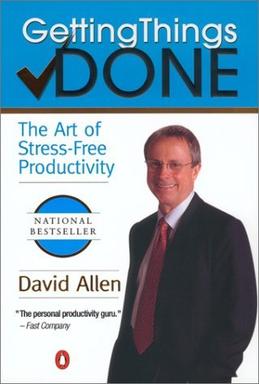
These are some notes I took from the book Getting Things Done by David Allen. Let me first start with the cons of the book. First the book is tediously repetitive, while some repetition is good to drill the concepts deep in your mind, the book overdoes it. Second, the book is clearly intended for people who’ve white collar jobs, mostly managers and executives.
But that does not mean that you cannot gatecrash the party. This book has really good ideas and insights that are helpful in unloading your mind and bringing order in your day-to-day life. Further David Allen makes it very clear that the GTD method, is helpful for, but is not the main tool for making decisions about the big things in your life, those are for you, and you alone, to figure out.
Philosophy
David Allen breaks up the work into six horizons. He calls them horizons to evoke the image of a vertical hierarchy.
| Horizon 5 | Life, this is as long term as it gets |
| Horizon 4 | Long-term visions |
| Horizon 3 | 1-2 year goals |
| Horizon 2 | Areas of focus and accountability |
| Horizon 1 | Current Projects |
| Ground level | Current Actions |
The levels at the top determine what you should be doing about the levels at the bottom in your life, however this is hard to do in practice as it is hard to decide what actions need to be taken by you now based upon, say, your life goal.
What GTD enables you to do is to take care of the bottom three horizons, so that these become a matter of habit, your brain does not have to worry about them any longer and is then free to think and get creative about the higher horizons.
The Setup
There are 5 stages to setting up the GTD system
- Capture what has our attention
- Clarify what each item means and what to do about it
- Organize the results, which presents the options we
- Reflect on, which we then choose to
- Engage with.
For the first step you need to recognize ALL the open loops in your mind to organize them. ALL is really important here so that your brain can trust that the system eventually and leave things to it.
Next you clarify what you’ve captured. If it is an action then you choose between Do, Delegate, Defer, Delete. The Do and the Delete need to be taken care of immediately.
Actions which take less than 2 mins should be done immediately.
The Delegate and Defer actions are organized in several CLEARLY DEFINED lists
| Calendar | contains ONLY the time sensitive tasks | to be reviewed DAILY |
| Next actions | non-time sensitive deferred tasks | to be reviewed DAILY |
| Projects | things which require multiple actions | to be reviewed WEEKLY |
| Reference | things you’ll need for projects | does not need review |
| Someday/Maybe | things you don’t need to take care of right now | does not need review |
The next actions list is best organized by context, however other structures might also be possible/effective.
Project Planning
Projects are the main structure of the GTD system and hence a lot of thinking is needed to set them up. There are 5 stages of project planning
- The Why: Defining purpose and principles
- The What: Outcome visioning
- The How: Brainstorming
- Organizing
- Identifying next actions
Purpose
This is the most important stage and all future action depends on the answer to this. The purpose should be clear and specific. The question
“How will I know when I’m off purpose?”
Should have a clear answer.
Principles
“What behavior might undermine what I’m doing and how can I prevent it?”
Principles define the parameters of action and criteria for excellent conduct.
Vision
“You won’t see how to do it unless you see yourself doing it.”
Brainstorming
- Don’t challenge, judge, evaluate, or criticize.
- Go for quantity, not quality.
- Put analysis and organization in the background.
Organizing
- Identify the significant pieces
- Sort by
- Components
- Sequences
- Priorities
- Detail to the required degree
Next Actions
Ask yourself: “What, specifically, would you do about something physically if you had nothing else to do right now?”
- Decide on the next actions for each of the current “moving parts” of the project.
- Decide on the next action in the planning process, if necessary.
Reflect
This is self-explanatory, which does not mean that it is easy to do. It’s not enough to set the system up and make incremental changes to it. Every once in a while you need to step back and update the system, and honestly check if it’s still doing what it’s supposed to do.